 By Diane Goddeeris and Lou Anna K. Simon
By Diane Goddeeris and Lou Anna K. Simon
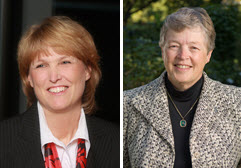
Mayor Goddeeris & President Simon
Few communities can match college towns for sheer vibrancy. Students contribute great energy to a place and, with a diverse group of exceptional faculty members and a rising international student population, there is an added cosmopolitan—even global dimension—to university communities such as East Lansing.
“Town–gown” tensions are always the other side of the coin, but they can be managed through close cooperation between a university and its home community. We’re proud of the working partnership we’ve formed to promote the development of citizen-scholars among the student body and integration of Michigan State University into local civic life.

Students attend Taste of East Lansing event.
At the strategic level, MSU and the City of East Lansing partner on planning and economic development activities, such as a planning exercise the university is funding focused on the corridor that forms our border. The greater objective is to examine what it will take to make this a world-class university community, which might help form the framework for the city’s upcoming comprehensive plan update.
Some of our most innovative partnerships involve creating jobs and retaining talent in the community—initiatives that helped us earn recognition as one of Entrepreneur Magazine’s “Best College Towns to Start a Business.”

The Technology Innovation Center (TIC).
East Lansing in 2008 developed the Technology Innovation Center (TIC), a downtown technology business start-up incubator, directly across from the MSU campus. Within six months, the TIC was occupied to capacity and has since served as a model for others around the country. Many businesses there stem from MSU research.
The university and city next cooperated to launch The Hatch, an adjacent student start-up business incubator. One enterprise it houses, TempoRun, is based on a mobile music/fitness application that in March won this year’s national Student Startup Madness business pitch competition at the South by Southwest Interactive Festival in Austin, Texas.
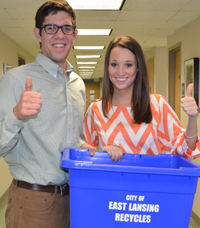
Students participate in East Lansing recycling program.
Michigan State reaffirmed its commitment to growing businesses locally by placing the MSU Innovation Center in the same commercial building housing the TIC and The Hatch. The Innovation Center is composed of MSU Technologies, the university’s technology transfer office; Business-CONNECT, its corporate and business liaison group; and Spartan Innovations, which supports faculty and student business start-ups with talent and financing. The TIC/Hatch/Spartan Innovations cluster helps bring MSU technology to the marketplace as rapidly as possible and puts university resources within closer reach of the business community.
In tough budget times, the university and city naturally look for ways to share resources to maintain high-quality services. Campus and city police do joint training, for example, and recently partnered to form an emergency Special Response Team. East Lansing operates our jointly owned wastewater treatment system and recently began providing water service to a portion of campus.
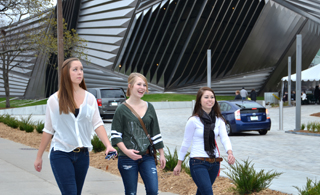
Students walk outside of the new Broad Art Museum.
What could become the most iconic symbol of campus and community integration opened just last November. Michigan State’s stunning Eli and Edythe Broad Art Museum was intentionally sited at the campus/city boundary along busy Grand River Avenue and designed to welcome visitors from both the campus and the city. The city embraced the new museum, providing signage, promotion, and activities to supplement the museum’s programming.
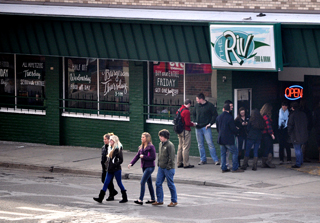
Students patron at businesses in downtown East Lansing.
Now we’re both actively engaged to recruit new businesses to complement the museum and add cultural vibrancy to the community.
To mitigate the inevitable conflicts arising between students and permanent residents, the city and university formed the Community Relations Coalition (CRC) to engage students residing off campus and local residents in programs designed to promote mutual consideration.
The CRC, which sponsors activities such as neighborhood cleanups and community conversations, was honored with the East Lansing Crystal Award for outstanding voluntary service to the community in 2011.
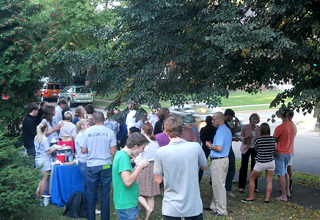
Ice cream social event in East Lansing.
We work to get students and East Lansing residents on the same page—literally—right from the start of the school year with our One Book One Community reading program.
Students also are engaged with the community during Fall Welcome with special shopping promotions and opportunities to support local charities. Another MSU–city event worth note is the annual East Lansing Welcomes the World program, which is a great example of our community and international students coming together.
Community service is a value Michigan State strongly encourages. Registrations at the MSU Center for Service-Learning and Civic Engagement, the nation’s oldest center of its kind, more than tripled in the last decade.
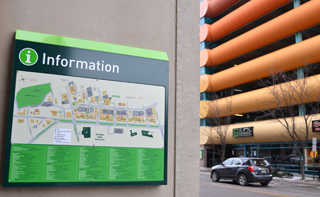
Signage helps link MSU and East Lansing.
Some 18,900 student registrations for volunteer service were recorded there in 2011–12. Students are volunteering at hospitals, youth organizations, and many nonprofits in Lansing and East Lansing. More than a thousand students were placed in area schools in the fall 2012 semester to work as tutors, classroom assistants, reading and recreation group supervisors, and more.
Michigan State’s 158-year heritage as the nation’s pioneer land-grant university means that community and stakeholder engagement—in East Lansing and indeed across Michigan—shares primacy with education and research imperatives.
East Lansing has grown up with the university, forming its own school district in 1900 and incorporating as a city in 1907. It now includes more than 25 neighborhoods with a number of active neighborhood associations and, with the university, produces popular summer art and folk festivals.
Diane Goddeeris is the Mayor of East Lansing and Lou Anna K. Simon is the President of Michigan State University.










